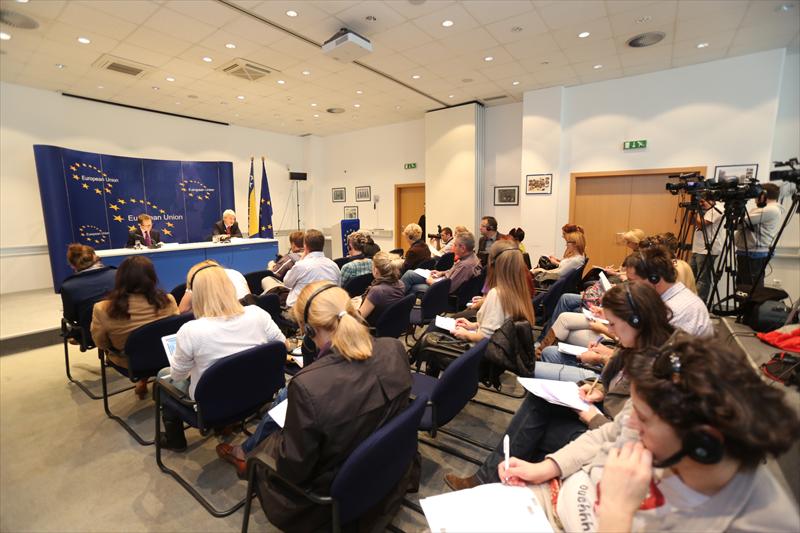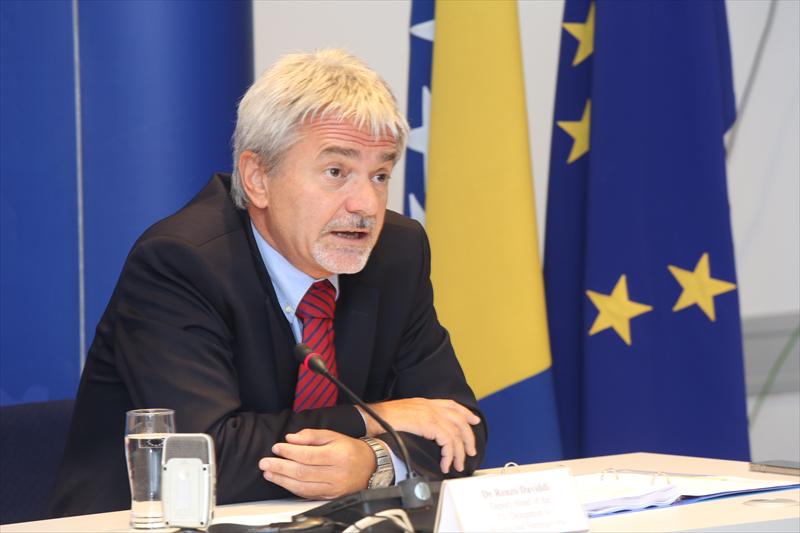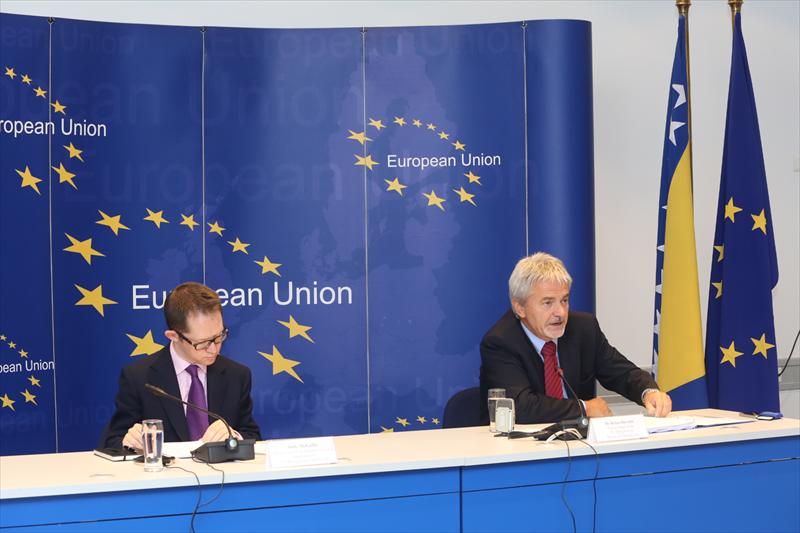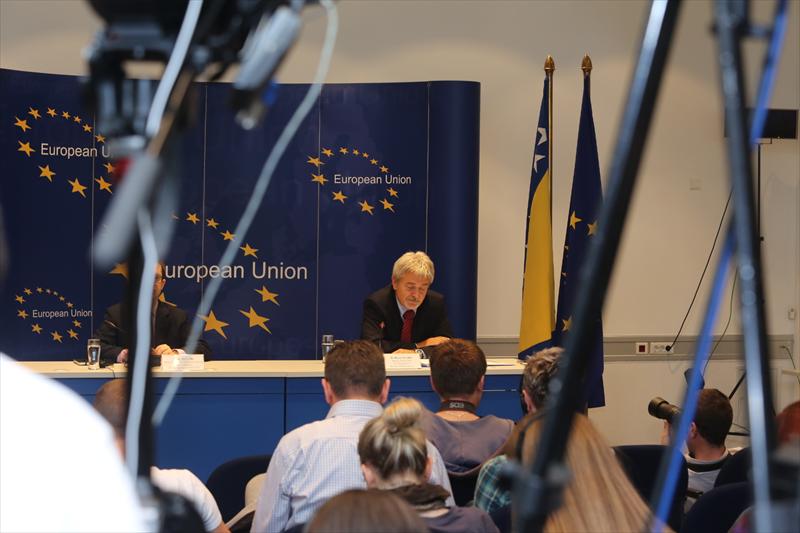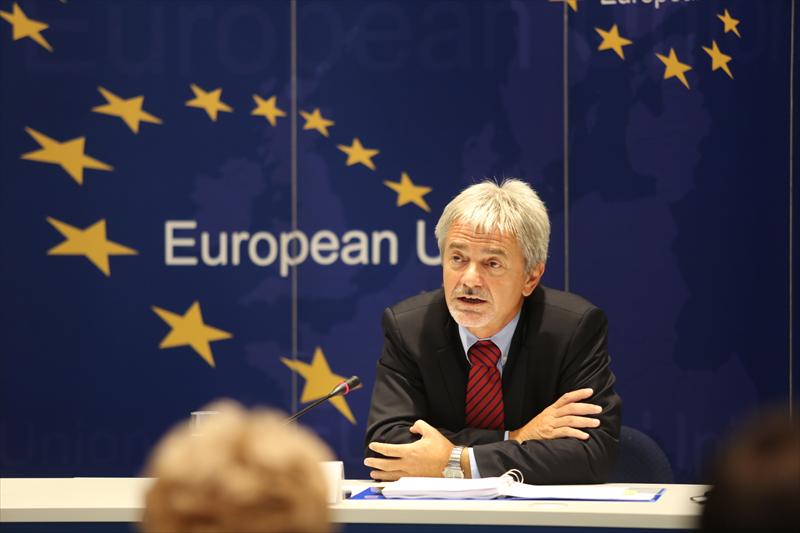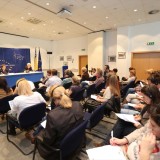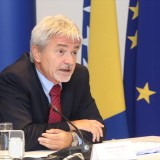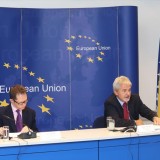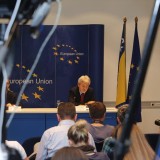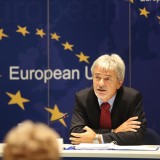Questions to Dr Renzo Daviddi, Deputy Head of Delegation, at the press conference on the annual Progress Report
Q: Dnevni avaz
As these negotiations on Sejdic-Finci continue, things are getting even less clear. Does the EU, the EC or the Delegation have an obligation to offer its own solution, suggestion, concept or anything like that? Is there a deadline by which this issue must be resolved, was that deadline last week, is it tomorrow, or is it April? Are you planning some plenary meetings with political leaders?
RD: OK. This was not one question, this was at least four! Let me try to go one by one.
The EU, in terms of the institutions, most notably the EC in this particular case, but also the Council, our colleagues in the External Action Service, this office, is very much in the business of facilitating a deal. We are not going to impose a deal. This is not part of our mandate. It’s not a part of our way of working. I would say, if I may go very far, it is not even part of our mentality because we are the EU and not other kind of institutions.
In this respect, we are certainly trying to facilitate this effort through bringing together a number of efforts of a different nature. We’ve been trying, as you know now for a very long period, months, through bilateral meetings to subsets of plenary meeting through plenary meetings to arrive at a consensus that is stemming out of the ideas that the different actors have been putting on the table at different points in time. We think that, during the month of October, at the two meetings that took place in Brussels, 1st of October and 10th of October, we sensed that the parties were moving closer to a deal, if I may use this word (I am sorry I cannot think of a better word at the moment), insofar as there were a number of principles on which they could agree, and even they subscribed to those principles on the 1st of October, and in terms of other discussions they were finally getting into some of the technical details. Because one thing is to agree on the principles, and there has been, as we know, problems even agreeing on the principles, but also even more complex is to get to a level of details when we would really need to figure out how the agreement in principles can be translated to amendment of the Constitution, precise text of drafted legislation etc.
And we are still in this process. It’s a process, as you know, that fully involved some of us, our office, part of the European institutions, and most notably the EC, even on the level of the Commissioner himself, who, as we know, has been part of these discussions already several times, both here and in Brussels.
I cannot tell you exactly what kind of format we are going to have in the next few days, but I will certainly not exclude any kind of format. For the time being we have continued to have a number of bilateral meetings trying to identify again, at the level of the details, no longer at the level of the principles, possible solutions, and to try to help the parties to agree on that.
Has this process a deadline? To a certain extent yes, but it is not a deadline which is imposed by the EU or by the European institutions; it is imposed by the elections that needs to be taking place in October 2014, the political elections, the elections for the Parliaments and the Presidency. We know that there are time limits for amending the legislation, especially the electoral law, and this brings us back to April 2014. It is very difficult to get something, it is impossible by Law to get something after April, and we are already in October and there is a legislative process that needs to be completed, that needs to be put in place. Elections, it is my understanding, but as you know is the understanding of a macroeconomist and I stand here to be corrected by lawyers, the elections cannot take place, the Central Election Commission cannot call for the election unless the current electoral law is amended. There is an issue with the judgements of the Constitutional court that must be addressed before the Central Election Commission can start the process for calling the elections.
Again, this issue goes even beyond the Sejdic-Finci, this issue goes to something, which is, even if you want, it’s nothing to do with Sejdic-Finci, it is to do with the names of a number of Electoral units of this country that has been declared illegal by the sentence of the Constitutional Court. Sorry for the extensive answer but you had a lot of questions.
Q: Federalna novinska agencija (FENA)
I don’t know if we are going to fight, Mr. Renzo and myself. Every year we are here, and you are giving us a lecture how we do not deliver anything and I really cannot, as a journalist and as a citizen of this country agree that EU doesn’t want to do anything. It’s not about the fact that you cannot do anything, it’s the fact that you don’t want to do anything. Let me remind you on a few thing in which we do not progress: functional market economy, corruption, respecting LGBTI rights. Could you please remind us what conditions Romania and Bulgaria had when they wanted to join the EU?
RD: I am not going to pick up the fight; it’s not even part of my personality. I’ll give you first the bureaucratic answer and then I’ll give you the political answer.
The bureaucratic answer is the following: the acquis is evolving and the later you start to get in the European Union, the more conditions you will face. Twenty years ago you didn’t need to meet the conditions of the economic and monetary union because the economic and monetary union was not there. The Euro was not there. Now, it’s non-derogable part of the acquis, which means that every country that wants to be a member of the European Union needs obligatorily to respond and to adopt the acquis which is related to the EMU. The same is for the other number of areas, including some areas of fundamental rights that you have been mentioning, including some that have been analysed into our Progress Report. And, it is clear that every year the Progress Report screen the reality with the eyes of this acquis, which is also an acquis that is evolving. The fact that in year A, certain conditions were not particularly relevant for country B, C and Y, it’s not relevant now. Because these are relevant for Bosnia and Herzegovina, if Bosnia and Herzegovina, as all other country that wants to become member of the European Union, wants to become member of the European Union.
So let’s say this is bureaucratic answer, and then there is political answer. I don’t think that a country in a transition and, let’s call it like that because it’s one of my favourite terms, is undertaking a process of transformation to please the European Union. The country in transition is a country that is coming out of a system that is obviously was not performing and it needs to adopt the institutions, the legal framework, the policy and even the mind-sets of its citizens to something which is completely different. And it needs to do it per se, not because it wants to become member of the European Union. So the point, at the end of the day is: you want to transform this country into an open society, which is based on democratic rules, where the open economy works… I am not going now to enter the dialogue what kind of model I would like to see implemented, and I cannot say it even for my country, let alone this one.
But if it is the case then I think we need to start moving and acting on it. Not because the European Union or the European Commission, or this office is asking, but because this country needs to embarking into a serious process of reforming and transformation. And as soon as it starts the better it will be and sooner it will be finished. Now we are wasting something like 15 years if I can calculate correctly in something which is sort of reforming, but it’s not reforming.
Q: BNTV
You were talking about the position of Bosnia and Herzegovina after the accession of Croatia into the EU. If I recall correctly, you said that you are disappointed with the BiH’s attitude. Did I understand correctly that you are disappointed because Bosnia and Herzegovina doesn’t want to give incentives to Croatia, and consequently to the rest of the EU member states – incentives from CEFTA agreement. While on the other side there are clear boundaries, related to the Croatia accession in the EU?
RD: The first part, yes, second: no. There is an issue, which is related to the adaptation of the Stabilisation and Association Agreement, but it’s not entirely related to CEFTA arrangement. It’s related to what, in jargon, is the amount of trade that has been taking place with different countries during the certain period of time. And this particular case, basically, the intuition is very simple. If you have been trading with Croatia for, let’s say ten years under a certain regime and the goods have been benefiting under that regime, that regime would need to be incorporated into the revision of the Stabilisation and Association Agreement.
Do we face a problem? Yes, we face a problem. The problem is that at some point in time, BiH has realised that part of the negotiation that has been taken into the framework of CEFTA has not been particularly favourable for Bosnia and Herzegovina. But, I don’t think this is something you want to ask yourself, that maybe the negotiation position at that point was correct one or not? I don’t see any reason why you need now to enter into a major trade row with the European Union, which moreover it’s not particularly advisable. Simply, because you made a mistake five years ago.
Q: TV1
When you were talking about the quotas increased related to the wine and sugar for Bosnia and Herzegovina, then Croatia said, yes we will talk about this, but you have to liberalise the borders, i.e. the import from EU in the BiH should be free, with no custom taxes. That’s the way Croatia discussed it with Bosnia and Herzegovina, i.e. how Brussels discussed with Bosnia and Herzegovina. Do you think that is a fair play?
RD: Unfortunately, again, we are facing a problem of an institutional nature. The kind of negotiation that Croatia has been undertaking with Bosnia and Herzegovina and with all other countries of the region, before 30th of June 2013 in trade related matter are negotiations of bilateral nature. As of the 1st of July 2013, every country that wants to negotiate trade matters is negotiating with the European Union, and most notably with the European Commission, because in this part of the acquis the power is mandated to the European Union, and in this respect trade policy is matter which is communitised and its policy is run by the European Union. Let’s say again, part of the advice at some point in time, I think it has been fair advice, it was to try to fix this kind of bilateral deals before 30th of June 2013 for whatever reasons and it’s not my problem. These have not been done, and of course, now you have been negotiating with the European Union.
Q: Hayat TV:
When we talk about the Sejdic-Finci, the leadres of two HDZ’s often offer solutions that in essence mean discrimination of BiH citizens. That means division of FBiH into two electoral units, presented as some apparent multiethnicity. But we all know that the wanted outcome is for the Croatian member of the Presidency to be elected from the five cantons where they are majority. And all of them are saying that EU advocates an electoral system, while EU is constantly denying this.
RD: I will comment on the process, not on the substance because I cannot comment on the substance. I hope we will soon have a press conference even bigger than this and with a lot of other people on the resolution of the Sejdic-Finci. We will know what is the kind of agreement that has been reached and we can discuss and comment on detail on the agreement. This is not the case so far. So I can’t speculate on what kind of deal we are going to be striking and to be honest, I have been dealing with this process for quite a few months, I have seen so many proposals, so many variants of proposals and models that I am not entirely sure if you can encapsulate things with one or two sentences. There are billions of variants and I think again – the devil is in the detail. So before we endorse a model or another model, let’s make sure what is that we are talking about, what is the framework.
And then there is another process. Quite frankly, I hope that if and when the deal is reached then this deal is the subject of the scrutiny to the citizens of this country. This is a constitutional reform and, as such, I think that citizens of this country may have the willingness to express their opinion on this deal and part of the issue that you’re raising will resonate in the public discussion on the deal.
Q: Nezavisne novine:
Again, about the Sejdic-Finci. Because of the lack of agreement the procedure of suspension of 47 million EUR has been initiated. How long will the European Commission wait for the agreement to be reached. What is the deadline? When can we expect for the suspension to be abolished or the money to be lost. Is that tomorrow?
RD: I think when it comes to the suspension of the funding, the process has already been launched and the procedure is moving. There are, of course, a number of processes which are in place, which takes number of weeks because, for instance, you have things like an inter-service consultations, that doesn’t mean anything to you but is the process where all the services of the Commission need to express their opinion on the proposal and there are a specific number of days in which this can be done. So, the process is continuing and I don’t think the process will be stopped neither tomorrow nor the day after tomorrow unless, clearly, there is a deal. It might even be the unfortunate case that we manage to get a deal but the money is gone, which is still possible.

